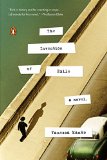Summary | Excerpt | Reading Guide | Reviews | Beyond the Book | Read-Alikes | Genres & Themes | Author Bio

A Novel
by Vanessa MankoThis article relates to The Invention of Exile
 Austin Voronkov, the protagonist of Vanessa Mankov's The Invention of Exile, spends two years in the Soviet Union with his American wife, Julia: from 1920 to 1922. This timeframe is part of a difficult period in Russian history, the 1917-1922 civil war between the Bolshevik Red Army and the White Army. This period is rendered with heartbreaking intensity by the poet Marina Tsvetaeva in Earthly Signs: Moscow Diaries, 1917-1922 The book comprises notes from several diaries and fragmentary essays on various subjects, mixing memories of daily hardships with passionate comments on poetry and vivid descriptions of people, all told with uncommon energy for someone who has to fight for survival every single second. The notes, often scribbled feverishly in trains or between house chores - doing laundry, cooking, cleaning - have the rhythm of poetry.
Austin Voronkov, the protagonist of Vanessa Mankov's The Invention of Exile, spends two years in the Soviet Union with his American wife, Julia: from 1920 to 1922. This timeframe is part of a difficult period in Russian history, the 1917-1922 civil war between the Bolshevik Red Army and the White Army. This period is rendered with heartbreaking intensity by the poet Marina Tsvetaeva in Earthly Signs: Moscow Diaries, 1917-1922 The book comprises notes from several diaries and fragmentary essays on various subjects, mixing memories of daily hardships with passionate comments on poetry and vivid descriptions of people, all told with uncommon energy for someone who has to fight for survival every single second. The notes, often scribbled feverishly in trains or between house chores - doing laundry, cooking, cleaning - have the rhythm of poetry.
In "Attic Life" Tsvetaeva describes her daily life: a woman in her late twenties living with her two children (five-year-old Alya and two-year-old Irina), whose husband is at war, with no one to help her, no means of subsistence, living simply out of her neighbors' charity and donated meals - some potatoes, maybe a soup or a doughnut. For two years she's been wearing the same dress, day and night. She goes out to fetch water, cleans the floors, washes the dishes in the basin, goes to pick up the rationed meals for the children, comes back, feeds them, puts the youngest one to bed, drinks a coffee, smokes, writes. Later, she prepares a dinner using the leftovers from lunch, then puts the girls to sleep. At midnight she is in bed, but not before chopping some wood, which sometimes comes from the sacrificed wooden stairs or handrail.
 When Tsvetaeva is offered a job at the Information Section of the Commissariat of Nationalities, she is incapable of doing anything that involves classifications, sections and subsections because she is viscerally appalled by the bureaucracy of the regime. As in all communist institutions, it is common for the people working in the Commissariat of Nationalities to go on "expeditions" during work hours in order to find food. Tsvetaeva reports as a big victory the day she comes back with several pounds of potatoes, which had been frozen, then thawed and now are rotting. On another occasion she goes on a trip to a so-called "requisitioning station," where she scrubs the floors and washes dishes for a family that has managed to successfully adapt to the circumstances of the new Bolshevik regime. The family runs a kind of cafeteria, for which, in good Communist style, it steals the goods but asks money for the meals.
When Tsvetaeva is offered a job at the Information Section of the Commissariat of Nationalities, she is incapable of doing anything that involves classifications, sections and subsections because she is viscerally appalled by the bureaucracy of the regime. As in all communist institutions, it is common for the people working in the Commissariat of Nationalities to go on "expeditions" during work hours in order to find food. Tsvetaeva reports as a big victory the day she comes back with several pounds of potatoes, which had been frozen, then thawed and now are rotting. On another occasion she goes on a trip to a so-called "requisitioning station," where she scrubs the floors and washes dishes for a family that has managed to successfully adapt to the circumstances of the new Bolshevik regime. The family runs a kind of cafeteria, for which, in good Communist style, it steals the goods but asks money for the meals.
Although the alternative to her job is starvation, Tsvetaeva, disgusted with the politics of the Commissariat, quits. Indeed, starvation does come when she places her daughters in a children's home, then takes back only Alya. It is there that Irina dies of hunger.
Earthly Sign is an extraordinary document for anyone who wants to know how people lived in the early years of the Soviet Union.
Photograph of Tsvetaeva in 1925, courtesy of Wikipedia
Filed under People, Eras & Events
![]() This "beyond the book article" relates to The Invention of Exile. It originally ran in October 2014 and has been updated for the
July 2015 paperback edition.
Go to magazine.
This "beyond the book article" relates to The Invention of Exile. It originally ran in October 2014 and has been updated for the
July 2015 paperback edition.
Go to magazine.
In youth we run into difficulties. In old age difficulties run into us
Click Here to find out who said this, as well as discovering other famous literary quotes!
Your guide toexceptional books
BookBrowse seeks out and recommends the best in contemporary fiction and nonfiction—books that not only engage and entertain but also deepen our understanding of ourselves and the world around us.